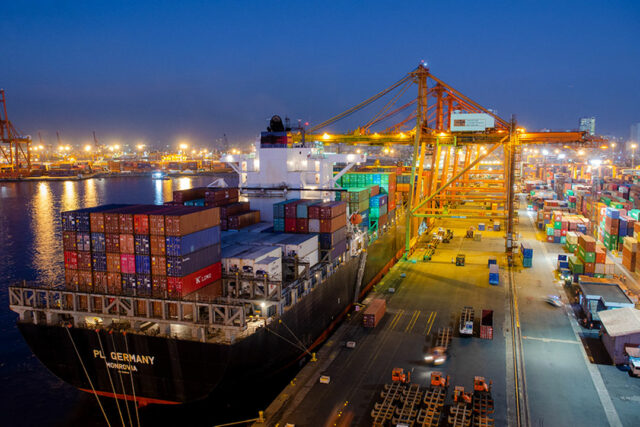Peso may be range-bound on escalating US-China trade war
THE PESO may move sideways against the dollar this week as markets continue to monitor the growing trade war between the United States and China.
The local unit closed at P56.97 per dollar on Friday, strengthening by 38 centavos from its P57.35 finish on Thursday, Bankers Association of the Philippines data showed.
Week on week, however, the peso was down by 14.9 centavos from its P56.821 finish on April 4.
“The peso rose on broad dollar sell-off, still on growing concerns of a recession and the escalating China trade war,” a trader said in a phone interview.
The dollar was generally weaker on Friday as the market continued to react to the Trump administration announcement of a 90-day pause on the “reciprocal” tariffs it imposed on most of its trading partners, Rizal Commercial Banking Corp. Chief Economist Michael L. Ricafort said in a Viber message.
For this week, the trader said the peso’s movements will continue to depend on the developing trade war between the US and China.
The trader sees the peso moving between P56.90 and P57.30 per dollar this week, while Mr. Ricafort said it could range from P56.75 to P57.25.
The dollar continued to slide against major currencies on Friday as the back-and-forth over import tariffs shook investor confidence in the safety of the greenback, sending it to its lowest level in a decade against the Swiss franc and a three-year low versus the euro, Reuters reported.
China increased its tariffs on US imports to 125% from 84% on Friday, retaliating against US President Donald J. Trump’s decision to hike duties on Chinese goods to a total of 145% after pausing many of his latest tariff hikes on most countries.
The dollar has been hit hard by a global sell-off that spread to stocks and even safe-haven US Treasuries. The yields on benchmark 10-year notes were on course for their biggest weekly jump since 2001.
Brad Bechtel, global head of FX at Jefferies, said dollar weakness is being driven partly by the view that US economic exceptionalism is waning — with the potential of a looming recession — and a switch from the dollar as a safe-haven asset to the yen and Swiss franc.
“There’s a great rotation, which is basically foreign investors diversifying away from the US into other regions such as the euro zone. And for those foreign investors still involved in the US, they’re realizing they need to currency hedge their assets. There’s a scramble to do so, which is putting additional pressure on the dollar.”
The greenback was down 0.51% at 144.05 yen after hitting its lowest level since September 2024. It was set for its largest weekly drop since early February.
The dollar index, which measures the greenback against a basket of currencies including the yen and the euro, fell 0.56% to 99.958 — hitting its lowest mark since April 2022. It was on track for its biggest weekly drop since early last month.
“Part of the dollar weakness in the past few weeks has been linked to worries over a recession or the Fed cutting rates, but it’s kind of gone beyond that,” said Win Thin, global head of markets strategy at Brown Brothers Harriman in New York.
“It’s more really loss of confidence and credibility in the dollar and then in US policy making. Typically in risk-off episodes, the dollar should gain as a safe haven, but it’s really been the yen and Swiss franc that have been picking that up, and the dollar has been under pressure.” — Aaron Michael C. Sy with Reuters
PHL shares may rise further on bargain hunting
PHILIPPINE STOCKS may extend their climb in the coming days on bargain hunting, with investors likely to stay on the sidelines amid a shortened trading week.
On Friday, the Philippine Stock Exchange index (PSEi) inched up by 0.07% or 4.62 points to close at 6,082.44, while the broader all shares index slipped by 0.03% or 1.18 points to 3,621.76.
Week on week, however, the PSEi was down by 0.03% or 1.75 points from the 6,084.19 finish on April 4, marking its fifth straight week of decline.
Philippine financial markets are closed on April 17 and 18 for non-working days in observance of Holy Week.
“Ahead of the Lenten pause, the local mark was not spared from a global rout driven by retaliatory tariffs, but was staved off by a predicated rate cut from the Bangko Sentral ng Pilipinas (BSP),” online brokerage 2TradeAsia.com said in a market note.
“The local market is already on a five-week losing streak as global trade war fears take over sentiment. On a positive note, the market is still able to keep its position above the 6,000 level,” Philstocks Financial, Inc. Senior Research Analyst Japhet Louis O. Tantiangco said in a Viber message.
On Wednesday, US President Donald J. Trump declared a 90-day pause on the “reciprocal” tariffs it imposed on most of the US’ trading partners including the Philippines, subjecting them to a 10% blanket duty instead of the adjusted rates announced earlier.
Meanwhile, the BSP on Thursday cut benchmark interest rates by 25 basis points (bps) to bring the policy rate to 5.5%, as expected by all 17 analysts in a BusinessWorld poll, putting its easing cycle back on track after an unexpected pause in February.
BSP Governor Eli M. Remolona, Jr. said the Monetary Board is considering further rate cuts this year in “baby steps” of 25 bps at a time.
The Monetary Board has now reduced borrowing costs by a cumulative 100 bps since it kicked off its easing cycle in August last year.
Mr. Tantiangco said bargain hunting following the market’s recent decline may continue to lift the PSEi this week. “Hopes of further easing by the BSP moving forward may also compel investors to take positions.”
“However, worries over the global economy amid the US’ protectionist policies and the possibility of retaliation by other countries may continue to weigh on sentiment. Investors are also expected to maintain a cautious stance especially by the end of the shortened trading week as they take into consideration the uncertainties on the days the market is closed,” he added. He placed the PSEi’s support at 6,000 and resistance at 6,400.
Rizal Commercial Banking Corp. Chief Economist Michael L. Ricafort put the PSEi’s support at 6,000 and minor resistance at 6,230-6,490.
“The PSEi posted relatively modest declines despite the recent volatility in the global stock markets,” Mr. Ricafort said.
For its part, 2TradeAsia.com pegged the PSEi’s immediate support at 6,000 and resistance at 6,400. — Revin Mikhael D. Ochave
Trump unpredictability pushing exporters to diversify markets
By Justine Irish D. Tabile, Reporter
THE Philippine Exporters Confederation, Inc. (Philexport) said its members need to diversify their markets in the face of the unpredictability of US trade policy.
“The problem is, knowing Trump, the situation is still fluid. He might change his mind on some aspects,” Philexport President Sergio Ortiz-Luis, Jr. told reporters.
“There are items now that are exempted… Those are things that he might change his mind on,” he added.
US President Donald J. Trump last week announced a 90-day pause on the duties he had unveiled on April 2. The April 2 tariff schedule featured some of the highest rates being imposed on members of the Association of Southeast Asian Nations (ASEAN).
Cambodia is facing a 49% tariff, followed by Laos (48%), Vietnam (46%), Myanmar (44%), Thailand (36%), Indonesia (32%), Malaysia (24%), and Brunei (24%).
The Philippines was assigned a 17% tariff, second in the region only to Singapore’s baseline rate of 10%.
With the 90-day pause now in place, all countries will be charged the blanket 10% duty until July, pending negotiations in Washington with various national delegations.
Following a virtual meeting on Thursday, ASEAN ministers committed to not imposing retaliatory measures in response to the US tariffs.
Mr. Ortiz-Luis said for the moment, the Philippines is in a good position, but “we have to watch for the changes that will happen because some are negotiating, some are retaliating, so I think we should just keep quiet and watch.”
In particular, Vietnam expressed openness to bringing down its tariffs on US goods to zero.
Asked if this is something the Philippines should do, Mr. Ortiz-Luis said that the Philippines is relatively a small market for the US.
“We are not such a big exporter to the US … We are not a big player to be able to affect the US,” he said.
Instead of helping exporters, he said that the zero rate on US goods will result in supply chain issues.
He said the Philippines needs to address its non-tariff barriers.
“Even with the lower tariff here, that may not be enough to counter the corruption issues and red tape, among others,” he said.
In its 2025 National Trade Estimate Report, the Office of the US Trade Representative identified bribery and corruption as among the barriers to trade in the Philippines.
“Corruption is a pervasive and longstanding problem in the Philippines. National and local government agencies, particularly the Bureau of Customs, are beset with various corruption issues,” according to the report.
“Both foreign and domestic investors have expressed concerns about the lack of transparency in judicial and regulatory processes,” it added.
Asked which markets the Philippines should focus on, he said, “China. Before, China was catching up to the US as our export market.”
“If you combine Greater China, they are more than double the US and Japan. So it is important that we continue with developing other markets,” he added.
Meat imports top 16% in Feb. as ASF continues to pressure supply
By Kyle Aristophere T. Atienza, Reporter
MEAT IMPORTS rose 16.18% year on year in February, the Bureau of Animal Industry (BAI) said, with domestic supply remaining constrained by African Swine Fever (ASF).
Meat shipments hit 99.681 million kilograms (kg) during the month, slowing down from the 137.999 million kg in January.
Pork accounted for 53.598 million kg of the total volume for February, up from 38.994 million kg a year earlier. It was down from 70.449 kg in January.
Chicken imports hit 31.679 million kg in February, lower than the volumes of 32.426 million kg a year earlier and 45.631 million kg a month earlier. Beef imports totaled 12.490 million kg, buffalo 1.876 million kg, turkey 21,588 kg, and lamb 15,825 kg.
Jesus C. Cham, president of the Meat Importers and Traders Association (MITA), said via Viber that ASF continues to “plague” pork production, while high input costs batter poultry production.
Agriculture Secretary Francisco Tiu Laurel, Jr. said in March that the hog population remains well below levels recorded before the ASF outbreak in 2019.
“Before ASF, we had nearly 14 million hogs, now, we have eight million. This creates a six-million head deficit,” he told the pork industry.
“With a growing population, demand is far higher than the previous 14 million,” he added.
The Department of Agriculture (DA) said in March that the BAI is working to ensure the commercial release by April of a Vietnamese vaccine against ASF.
Mr. Cham, meanwhile, said the release of the meat import allocation under the minimum access volume (MAV) remains delayed.
Pork imports falling within the MAV quota are subject to a tariff of 15%, against the regular rate of 25%.
The DA said in April it will overhaul the MAV rules, noting that the allocations have been “exploited by a small number of accredited importers.”
The MAV allocation for pork is 55,000 metric tons (MT), with 30,000 MT going to meat processors.
“At the same time Customs has been targeting higher revenue via high valuations. We will see the effects in the coming months,” Mr. Cham said.
“Meat imports are needed to fill the gap in supply, except for chicken which is sufficient in supply,” Philippine Chamber of Agriculture and Food, Inc. President Danilo V. Fausto said via Viber.
National Federation of Hog Farmers, Inc. Vice-President Alfred Ng, meanwhile, said concerns over higher tariffs imposed by the US will likely prompt the Philippines to maintain the low duties on meat and other agriculture products for longer “for fear of retaliation by the Trump administration.”
“This is not good for livestock raisers,” he said via Viber.
“We are seeing a chaotic economic new order shaping up and we are at its mercy since we are heavily dependent on food imports to feed our growing population,” he said.
“We must go back to basics — support our agriculture industry, support our farmers, and encourage more local production for ultimate food security and food sovereignty,” he added.
The US, which accounts for about 17% of total Philippine agriculture trade, on April 9 announced that it is pausing its plan to impose additional tariffs on most countries — except China — for 90 days.
The Philippines has been assigned a 17% tariff. In Southeast Asia, Cambodia faces the steepest tariff at 49%, followed by Laos (48%), Vietnam (46%), Myanmar (45%), Thailand (37%), Indonesia (32%), Malaysia (24%) and Brunei (24%). Singapore will be charged a baseline tariff of 10%.
Unsolicited proposal for Davao Airport remains under review, PPP Center says
THE unsolicited proposal for the operations and maintenance of the Davao International Airport is still under review, the Public-Private Partnership (PPP) Center said.
“For Davao Airport, at least the post-PPP code unsolicited proposal is still under evaluation,” PPP Center Deputy Executive Director Jeffrey I. Manalo said via Viber.
According to the PPP Center website, the project is still being evaluated by the implementing agency.
The P12.90-billion project was submitted by Davao International Airport Consortium, according to the PPP Center. The project is among the airports being considered for privatization.
The Davao International Airport Consortium is composed of Asian Infrastructure and Management Corp.; Filinvest Infra-Solutions Ventures, Inc.; and JG Summit Infrastructure Holding Corp.
Francisco Bangoy International Airport, also known as Davao International Airport is being readied for upgrade and expansion to a project proponent that will also operate and maintain the facility.
The PPP Center said the proposal will be implemented under a rehabilitate-operate-transfer arrangement with a 30-year concession agreement.
Last week, the Department of Transportation said that it is looking to tap the private sector to operate and maintain up to 20 airports to help expand and upgrade regional hubs. — Ashley Erika O. Jose
Paperless trade seen requiring more reforms
By Justine Irish D. Tabile, Reporter
THE introduction of paperless trade will require reforms to the regulatory infrastructure and legal framework, according to the Philippine Exporters Confederation, Inc. (Philexport).
Citing Philippine Chamber of Commerce and Industry (PCCI) Chairman George T. Barcelon, Philexport said that a number of laws and policies are already in place to support electronic trade.
“(But) more needs to be undertaken to make the regulatory infrastructure and legal framework truly supportive of the transition to paperless trade,” it added in a statement over the weekend.
The PCCI said paperless trade makes processes more efficient, reduces costs, and makes the economy more competitive.
However, the business group said that “it is not going to be easy due to roadblocks that [the country] still has to overcome.”
“We need the amendment of laws, regulations, and policies to support the shift to digital transactions and to be aligned with international standards,” Mr. Barcelon said.
According to Mr. Barcelon, the interoperability of current platforms remains an issue. He said that the government and private sector need to develop common technical standards and data formats.
“Another issue is the rise of cyber threats such as hacking, fraud, and data breaches that pose a significant risk to the security and integrity of electronic data,” he said.
He said comprehensive cybersecurity regulations and strict enforcement of security standards should be put in place.
“Many companies, particularly the micro and small enterprises, don’t have the capacity to engage in digital trade due to issues like connectivity,” he added.
United Nations Economic and Social Commission for Asia and the Pacific Chief of Trade Policy Yann Duval said that digitizing trade data is “no longer an option.”
“Trade digitization benefits are clear. The most recent estimates we have show that achieving cross-border paperless trade could boost Philippine exports by about $9 billion, or 18%, including through a 4% reduction in trade cost,” he said.
He said that trade digitalization will result in improved wages and reduced prices and carbon dioxide emissions.
Trade Undersecretary Allan B. Gepty said electronic transferable records (ETRs) are crucial in international trade.
“Being the electronic equivalent of commercial documents such as bills of lading and letters of credit, ETRs are the key to unlocking smoother trade financing by allowing the uniform and harmonized cross-border flow of commercial data as well as more efficient global trade and supply chains,” Mr. Gepty said.
He recommended the adoption of the United Nations Model Law on Electronic Transferable Records, which is expected to empower businesses in efficiently participating in the global marketplace.
French businesses exploring expanded Philippine footprint ahead of EU-PHL free trade deal
MORE French businesses are looking to invest in the Philippines amid the negotiations for a free trade agreement (FTA) with the European Union (EU) and the launch of direct flights between the Philippines and France, according to the French Chamber of Commerce and Industry in the Philippines (CCI France Philippines).
“I believe that from what we have seen, at least in the last couple of years, there is definitely a growing interest from the French side in investing in the Philippines,” CCI France Philippines President Jacque Christophe Branellec told BusinessWorld on the sidelines of the France-Philippines Business Forum on Friday.
“We have a lot of big conglomerates from France investing in sectors like renewable energy and infrastructure. There have been attempts also in agriculture, and there’s also big interest in terms of defense and energy in general as well,” he added.
He sees a big opportunity in retail, as many French brands and products are already present in the country.
“I think France has a lot to offer to the Philippines and the Philippine market; the consumer market also appreciates the French brand and French products,” he said.
Currently, the Philippines is a beneficiary of the EU Generalized Scheme of Preferences Plus (GSP+), while negotiations are ongoing for the EU-Philippines FTA.
“There is a quite large trade deficit between France and the Philippines. So that’s something that we can also work on by sending more or exporting more Filipino products to France, as well as having French investments and products being imported here,” he added.
Bilateral trade between the Philippines and France is valued at 3 billion euros per annum.
Minister Delegate for Foreign Trade and French Nationals Abroad Laurent Saint-Martin said that there are currently over 150 French companies operating in the Philippines, employing nearly 100,000 people.
“These figures continue to grow year after year, reflecting the expansion of our economic partnership and the increasing interest of French businesses in the Philippine market,” he said.
However, he said trade between the Philippines and France “remains below full potential.”
“The Philippines is only France’s sixth-largest ASEAN trading partner. It is an indicator of untapped opportunities that we must seize together,” he added.
He said that he hopes the recently launched Air France direct flights will help facilitate trade, tourism, and business exchanges.
“It is the only direct flight from Manila to Europe. It is very important to connect people directly to showcase the strengths and what we want to do between our two countries,” he said.
“This new route marks a tangible milestone in our relations… I sincerely hope that this direct link will help increase the Philippines’ … visibility among our business community,” he added.
Pamela Villangca, country manager for Air France, said that the market has grown 25% since the launch of direct flights in December, as more Europeans visit the country and as more Filipinos visit France and other European countries.
“Since the launch in December… we’ve had good take-up, approximately 80-90% seat factor,” she said.
“Admittedly, there’s a lot more for the inbound sector that we need to fill. But generally, we’ve seen quite a good performance since the launch,” she added.
She said that the company currently works with travel agencies and operators to increase inbound tourism from Europe.
Asked why the inbound business is not keeping up with outbound, she said European travelers have more options in Southeast Asia.
“There’s Indonesia, there’s Thailand. So there are other options for not just the French, but the entire European community,” she said.
“But the Philippines is a growing market. I believe the Department of Tourism is working very hard to really introduce the Philippines as a main destination in Southeast Asia. There are diving spots here that Europeans love to travel to,” she added.
Meanwhile, Mr. Saint-Martin said that the EU-Philippines FTA is not just a beneficial agreement but a necessary tool in unlocking the full potential of the France-Philippines partnership.
“It will enhance market access, create new business opportunities, and provide a clear and predictable framework for investors on both sides,” he said.
“Therefore, France fully supports these negotiations and stands ready to work alongside the Philippines to achieve a cooperative and mutually beneficial agreement,” he added.
According to Trade Undersecretary Allan B. Gepty, the Philippines and the EU are set to meet in a third round of negotiations in June.
“I can say that our negotiations are still on track based on the timelines that we have agreed on. But of course, we are also conducting intersessional meetings so that we can address our issues in the various chapters we are negotiating,” he said.
“So far, negotiations have been very smooth. Our engagement with our counterparts in the EU was very productive and constructive. So we are really hoping that we can fast-track the text-based negotiations so we can already start with the market access aspect,” he added.
He said that one of the factors driving the Philippines to conclude a deal quickly is its impending departure from the EU GSP+ program.
“We are trying to avoid our preferential trade in the EU market being disrupted. It is very important that before we graduate from the EU GSP+, we conclude negotiations for the FTA,” he added. — Justine Irish D. Tabile
Tunnel segment of Davao City bypass nearing completion
THE Department of Public Works and Highways (DPWH) said it is close to completing the 2.3-kilometer twin tube tunnel segment of the Davao City Bypass project.
In a statement on Sunday, the DPWH said the project was at 91% completion after the north and south ends of the northbound tunnel were connected.
The 2.3-kilometer road is part of the Contract Package (CP) I-1 which has an estimated cost of P13.3 billion, according to the DPWH website. It is targeted for completion this year.
The Davao City Bypass is expected to help decongest Davao City roads by offering an alternative route. The project runs through the mountains and connects Davao City via the tunnel and Panabo City via Davao del Norte.
“The construction breakthrough of the northbound tunnel, along with the ongoing excavation works for the remaining 202 meters of the southbound tunnel… marks significant progress in this strategic infrastructure project,” DPWH said.
The 45.6-kilometer bypass road in Davao region has an overall cost of P70.82 billion. It is being financed through a combination of loan agreement with the Japan International Cooperation Agency (JICA) and government funds.
Meanwhile, CP II-1 and CP II-2 are now 72.83% and 63.89% finished, respectively.
CP II-1, valued at a P4.33 billion, is expected to be completed by the first quarter of 2026. This segment features a four-lane road and has seven bridges; while CP II-2, which is scheduled for completion in the third quarter of next year, is a 3.52-kilometer road section valued at P4.60 billion.
The DPWH said it is set to start procurement activities for the remaining contract packages of the project. — Ashley Erika O. Jose
Driving business growth through strategic transformation
Second of two parts
IN BRIEF:
• Philippine CEOs are embracing transformation to remain competitive and drive sustainable business growth in an evolving business landscape.
• Global disruption, macroeconomic uncertainty, and increasing pressures relating to sustainability are among the critical considerations in the transformation agenda.
• CEOs are looking to leverage M&A to accelerate transformation, especially in terms of achieving operational efficiencies and customer-centric innovation.
Tasked with navigating a more complex business landscape in 2025, it is crucial for business leaders to implement bold strategies to effectively steer their organizations toward a clear vision for the future.
In order to provide CEOs with the necessary insights to accomplish this, EY-Parthenon conducted the EY CEO Outlook Pulse survey, which gathers insights from 1,200 CEOs worldwide, including Philippine respondents. The survey explores the ongoing transformations within organizations, driven by executive leadership. In the Philippine edition of the survey, SGV zooms in on the unique perspective provided by CEOs here on their expectations for future growth and long-term value creation in light of the global uncertainties and the country’s current economic conditions, aiming to deliver essential insights into market trends affecting major companies in the Philippines.
In the first part of this article, we discussed the growth of the Philippine economy, its challenges, and the cautious optimism of CEOs as they seek to prioritize strategic initiatives for 2025. This second part will discuss how CEOs are embarking on transformation initiatives to accelerate business advancement, including mergers and acquisitions (M&A) as a catalyst for growth and transformation.
TRANSFORMING OPERATIONS
Enhancing offerings and operations is crucial for sustainable business growth. With the emergence of digital banking, e-commerce, and AI-powered solutions, traditional business models are also evolving to become increasingly aligned with technological innovation. Furthermore, globalization is driving shifts in consumer behavior and trends in the job market, providing both customers and employees with a broader range of businesses to engage with or patronize.
In light of this, it is essential for companies to refine their strategies in three key areas: customer journey, talent management, and operational optimization. The survey shows that Philippine CEOs prioritize these transformation outcomes for the next 12 months, with 50% emphasizing the importance of maintaining strong customer relations, 46% focusing on enhancing product offerings, 42% prioritizing employee retention, and 40% aiming to optimize operations.
Transformation initiatives that leverage data to deliver more personalized experiences are crucial for driving customer loyalty and expanding customer bases. For example, the shift to omnichannel retail, which offers customers an integrated shopping experience across both physical and digital platforms, has enabled companies to implement more targeted marketing campaigns using data collected from various channels. Similarly, programs that align company culture with employees’ personal value systems enhance retention and productivity. In both instances, companies are increasingly creating pathways to ensure that customers and employees strongly connect with the products and services they provide, thereby securing business growth.
The respondents underscore the significant impact of external uncertainties on effective transformation. Over 60% of Philippine CEOs identify the growing interconnectedness with external stimuli, macroeconomic and policy-related uncertainty, and sustainability pressures as highly pressing trends that may influence their transformation agendas.
Supply chain disruptions, global market volatility, and regulatory changes are also among the challenges that CEOs anticipate in the coming year. Furthermore, there is mounting pressure to adopt and comply with sustainability-related practices as regulations continue to evolve. This includes the implementation of the IFRS Sustainability Disclosure Standards, the enactment of the Extended Producer Responsibility (EPR) law, the Philippine Ecosystem and Natural Capital Accounting System (PENCAS), and advancements in the legislation of the Low Carbon Economy Act. Companies are increasingly incorporating sustainable practices into their operations, as evidenced by the emergence of the electric vehicle industry and the growth of the renewable energy sector.
Philippine CEOs acknowledge that there is still potential for improvement in implementing effective transformation initiatives. Notably, 60% of CEOs indicate that significant improvements are necessary in building resiliency to address sudden disruptions. Enhancing resiliency by developing roadmaps that are iterative and flexible to accommodate inevitable disruptions will be a key differentiator among successful initiatives.
Moreover, cost-saving measures are regarded as essential for ensuring the sustainability of transformation programs, with 50% of CEOs emphasizing this as an area requiring major improvement. A common strategy to reduce costs involves outsourcing certain functions within transformation initiatives. For instance, strategy advisory services are frequently employed to create efficient programs and expedite delivery. Additionally, operational and IT capabilities that necessitate substantial investment are often outsourced to facilitate the scalability of infrastructure required for transformation.
Among the Philippine CEOs who identified operational optimization and productivity enhancement as their transformation priorities, as much as 73% express strong confidence in achieving these outcomes. Similarly, those who selected sustainability targets, enhancing offerings, improving talent management, and reimagining their business models also maintain a positive outlook, with over 50% indicating they are very confident in reaching these goals. Conversely, 71% of Philippine CEOs prioritizing customer engagement and top-line growth are only moderately confident.
Overall, CEOs demonstrate greater confidence in achieving transformation outcomes that are within their internal organizations. However, when it comes to outcomes heavily reliant on the external market, CEOs exhibit only moderate confidence, reflecting their anticipation of external uncertainties. Despite ranking the improvement of customer engagement and retention as the top priority for transformation initiatives, most CEOs remain only moderately confident in achieving this goal, indicating a need for more robust strategies and clearer metrics to measure progress and success in addressing external uncertainties.
M&A AS A CATALYST FOR GROWTH
As CEOs navigate an era marked by economic pressures, technological disruption, and evolving consumer demands, 94% of leaders envision transaction initiatives as a means to accelerate their transformation journeys.
The Philippines’ robust GDP growth of 5.6% in 2024, coupled with investor-friendly policies targeting high-growth industries such as transportation, renewable energy, and telecommunications, has created a conducive environment for increased M&A activity, with the number of deals rising from 87 in 2023 to 113 by the end of 2024 and positioning the country as a dynamic player in the Asia-Pacific.
This surge was supported by emerging fintech capabilities in the financial services sector, the rise of data hubs in the technology sector, and a shift toward renewable energy in the energy sector. Additionally, improved tax incentives, such as enhanced deductions and value-added tax zero-rating for priority sectors enacted through the CREATE MORE Act implemented in November, are expected to attract more foreign investors, positioning the Philippines as an appealing investment hub.
CEOs are indicating an increased emphasis on M&A and strategic partnerships in the coming year, anticipating that operational efficiency will bolster internal growth. In the Philippines, 60% of CEOs have identified potential M&A transactions, surpassing the global average of 56% and closely aligning with the Asia-Pacific average of 61%. This trend reflects shared regional dynamics driven by economic expansion and investment opportunities.
Divestments, spin-offs, and initial public offerings (IPOs) are also key areas of focus for 52% of CEOs, reflecting their intent to streamline operations and reallocate resources toward transformative initiatives. Similarly, 50% of CEOs anticipate joint ventures or strategic alliances to leverage complementary strengths, enhance operational capabilities, and better respond to evolving customer needs. These strategic actions underscore a commitment to driving efficiency and fostering innovation as businesses adapt to a rapidly changing environment.
Looking ahead, CEOs are expected to take a more proactive approach in utilizing M&A to accelerate both operational efficiency and customer-centric innovation. Collaborating with other companies allows businesses to achieve economies of scale, streamline processes, and integrate advanced technologies to enhance cost structures. For example, acquisitions in AI, automation, and cloud computing can significantly boost productivity and efficiency, ultimately leading to improvements in the bottom line.
Simultaneously, M&A allows companies to stay ahead of evolving consumer demands. Through acquisitions, businesses can quickly expand their product offerings, integrate new service models, and enhance customer experiences. Strategic deals in fintech, customer experience platforms, and digital infrastructure illustrate how Philippine companies are leveraging M&A to strengthen their customer propositions. The integration of these strategies will be crucial for driving transformation and achieving long-term growth in an increasingly dynamic business landscape.
DRIVING SUSTAINABLE GROWTH IN 2025
As the Philippine economy continues to evolve, corporate leaders must remain agile and forward-thinking to navigate the complexities of the business landscape. The insights gathered from the Philippine edition of the EY CEO Outlook Pulse survey highlight the importance of balancing optimism with strategic decision-making, particularly in the face of both local and global challenges.
By prioritizing investments in technology, embracing M&As, and focusing on enhanced customer engagement and operational efficiency, Philippine CEOs are well-positioned to drive sustainable growth. As they prepare for 2025 and beyond, fostering resilience and adaptability will be key to seizing opportunities and mitigating risks, ultimately ensuring that their organizations thrive.
This article is for general information only and is not a substitute for professional advice where the facts and circumstances warrant. The views and opinions expressed above are those of the author and do not necessarily represent the views of SGV & Co.
Noel P. Rabaja is the strategy and transactions leader of SGV & Co.
PHL urged to broker US-ASEAN talks

By Chloe Mari A. Hufana, Reporter
THE PHILIPPINES should leverage its close ties with Washington and act as a broker between the US and Association of Southeast Asian Nations (ASEAN) as the bloc tries to negotiate for lower reciprocal tariffs under President Donald J. Trump, analysts said.
“Manila can undoubtedly serve as a broker or mediator to facilitate a dialogue between ASEAN and Washington in light of the colossal reciprocal tariffs imposed on ASEAN member states,” Josue Raphael J. Cortez, ASEAN Studies lecturer at De La Salle-College of St. Benilde, told BusinessWorld in a Facebook Messenger chat.
“We can leverage our strong bilateral ties with the US to encourage both parties to come into dialogue and discuss how we can collectively navigate these tariffs, which may have nuanced repercussions on our respective economies,” he added.
Mr. Cortez said the Philippines has been active in multilateral diplomacy, having led global discussions on the law of the sea and playing a key role in securing the United Nations’ framework on poverty eradication, which remains in effect through 2027.
Regionally, Manila’s diplomatic credentials date back to its early efforts within ASEAN, including its advocacy during the Cold War to retain Cambodia’s seat in the UN amid the Vietnamese-backed regime during the Khmer Rouge period, he added.
The US imposed steep reciprocal tariffs on several ASEAN member states earlier this month, triggering calls for dialogue.
In ASEAN, Vietnam was slapped the hardest with a 46% reciprocal tariff on its exports to the US, while Singapore had the lowest tariff at 10%. The Philippines was slapped with a 17% tariff, the second-lowest in the region.
In a meeting last week, ASEAN decided against imposing retaliatory tariffs on the US, opting for diplomatic engagement to address escalating tensions. In a joint statement, ASEAN economic leaders said they would engage in a frank and constructive dialogue with the US.
The 10-member bloc, collectively the world’s fifth largest economy, relies heavily on exports as a growth driver.
It emphasized the importance of open communication and collaboration to ensure a balanced and sustainable relationship with the US.
Hours after the reciprocal tariffs took effect on April 9, Mr. Trump imposed a 90-day freeze in all countries except China.
After this, American Treasury Secretary Scott Bessent said more than 75 countries contacted the US Trade Representative (USTR) to negotiate new tariffs.
Mr. Cortez noted that tariffs are among the tools of modern diplomacy, replacing military power to compel other countries to adhere to something.
“Over-imposition of tariffs may also be a double-edged sword on the part of those imposing it,” he said, citing countries that opt for retaliatory tariffs.
Frederick D. Go, special assistant to the President for investment and economic affairs, last week said the Philippines had reached out to the USTR to negotiate for lower tariffs. He said he would go to Washington for a dialogue.
He also said the Philippines is aiming for a free trade agreement with the US.
The Philippine government kept a cool tone on Mr. Trump’s tariffs, calling the move an opportunity. Mr. Go earlier said the country is in a “semi-good place” since it is one of the lowest-hit countries.
The 17% tariff would only affect 0.1% of the country’s economic output, Mr. Go said, citing the National Economic and Development Authority.
But Filomeno S. Sta. Ana III, co-founder and coordinator at Action for Economic Reforms, said the reciprocal tariffs could also have second-hand effects.
“Unless those steep tariffs are reversed, expect a significant slowdown in the global economy,” he told BusinessWorld in a Viber chat. “A global trade war, particularly a clash between giants, is a real war but using different weapons. In this scenario, everyone suffers badly.”
He also said geopolitical conflicts could hit the Philippines given its close alliance with the US.
Under Mr. Trump’s second term, the US escalated its use of tariffs as a central component of trade policy, marking a shift toward protectionism.
Apart from the reciprocal tariffs, he enforced a 10% baseline tariff on almost all imported goods.
Notably, Chinese imports face 145% tariff, intensifying the trade war between the world’s two biggest economies.
Senate, House aspirants told to push austerity, protectionist policies
By Kenneth Christiane L. Basilio, Reporter
CONGRESSIONAL CANDIDATES for this year’s midterm elections should push austerity measures and policies to improve tax collection once elected to help cut Philippine debt and narrow its budget deficit, economists said.
These involve economic policies that seek to plug the budget gap through spending cuts, tax hikes, or both.
 “There is a need for tax and fiscal reform measures to narrow the budget deficit and bring down the National Government’s debt-to-GDP (gross domestic product) ratio to below the international threshold of 60% to make fiscal and debt management sustainable over the long-term,” Michael L. Ricafort, chief economist at Rizal Commercial Banking Corp., said in a Viber message.
“There is a need for tax and fiscal reform measures to narrow the budget deficit and bring down the National Government’s debt-to-GDP (gross domestic product) ratio to below the international threshold of 60% to make fiscal and debt management sustainable over the long-term,” Michael L. Ricafort, chief economist at Rizal Commercial Banking Corp., said in a Viber message.
The Philippine government’s outstanding debt climbed to a record P16.63 trillion in February, up 1.96% from a month earlier, data from the Bureau of the Treasury showed.
Debt as a share of GDP edged up to 60.7% by end-2024 from 60.1% a year ago, slightly higher than the threshold considered manageable by multilateral lenders for developing economies such as the Philippines.
The country’s budget deficit rose 4.11% to P171.4 billion in February a year earlier.
Mr. Ricafort said candidates should look at broadening the government’s tax base by exploring taxes on sugary beverages and single-use plastics, while also considering measures to boost taxes.
“At the very least, [there should be policies] that could intensify tax collections… and run after tax cheats to improve overall tax payments,” he said.
Candidates should also come up with policies that would help propel the Philippines toward becoming an upper-middle income country, such as policies that address “short-term inflation concerns, long-term economic resilience and inclusive growth,” said John Paolo R. Rivera, a senior research fellow at the Philippine Institute for Development Studies.
An upper middle-income status means having an income per capita of $4,516 to $14,005, according to the World Bank.
“The 2025 midterm elections will be crucial in shaping the Philippines’ economic trajectory, as policymakers will need to continuously address post-pandemic recovery, global uncertainties, long-standing structural issues and aspirations to achieve its upper middle-income status,” Mr. Rivera said in a Viber message.
He added that candidates should consider policies to streamline investments in human capital development, helping the country maximize its demographic dividend by having more productive working-age Filipinos.
The Philippines’ human capital indicators are “lackluster” compared with other countries, the World Bank said in a report in June 2024. A Filipino child could only achieve half of their productive potential by the time they reach 18 years, it said.
Candidates should also consider protectionist trade policies, such as foreign investment regulations and support for local companies to boost domestic industries, said Jose Enrique A. Africa, executive director at think-tank Ibon Foundation.
“Candidates should have concrete programs for… rural development, national industrialization and long-term technological and economic development,” he said in a Viber message.
“The policy tool box for this should include trade protection, foreign investment regulation and meaningful domestic subsidies, financing and other support,” he added.
He said the Philippines’ inclination toward “free market policies” had led to stunted growth. “This made the Philippine economy over-reliant on low productivity services, overseas work and remittances and debt-driven infrastructure to attract foreign investment.”
Millions of Filipinos will pick a new set of congressmen, 12 of the 24-member Senate and thousands of local officials on May 12.













